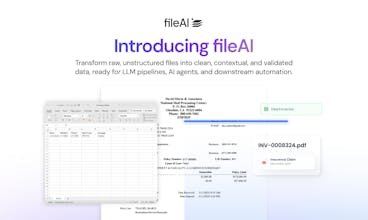
fileAI
Classify, extract, enrich, and validate any file
5.0•28 reviews•280 followers
Classify, extract, enrich, and validate any file
5.0•28 reviews•280 followers
fileAI gives developers structured, zero-shot data from any file. Built for LLMs and AI agents, our AI OCR transforms unstructured files into clean, enriched, and validated data, ready for downstream automation via configurable UI, API or MCP.






fileAI
The languages piece is a great callout. Across our customer base we regularly process documents in Thai, Japanese, Mandarin, Bahasa, and Tamil. It's not just the languages, but the layouts as well! Thai traffic tickets, Japanese medical forms...the challenges we see and perform on daily are a blast.